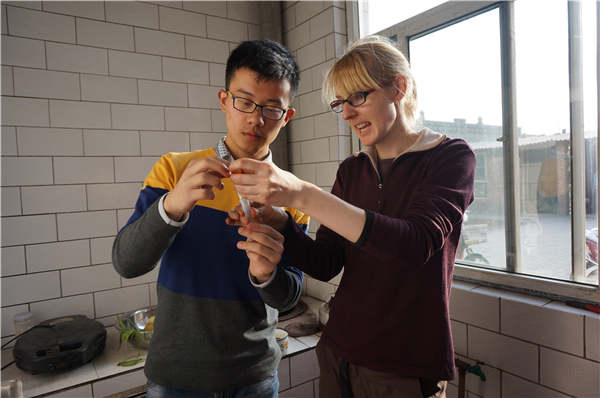Arsenic and old nails


Students from the Rural International Student Exchange program at Tsinghua University are helping villagers in Shanxi province purify drinking water. Zhang Zefeng reports.
Even in his childhood, Liang Honggang had the impression the water quality in his village was poor. However, he didn't fully realize how bad it was until he attended high school in the nearby city of Pingyao and had access to tap water.
"The water just tastes different," says Liang, now a 23-year-old graduate of Taiyuan University of Technology. "Back home, the water is smelly, especially during summer."
This is not that surprising since the water in the small village of Liangjiabu in Shanxi province is primarily untreated groundwater from two wells.
But aside from having the odor and sediment, the water is also contaminated with arsenic.
Last summer a team of 13 students from Rural International Student Exchange at Tsinghua University, a nonprofit organization dedicated to solving rural environmental problems in China, visited the village and tested the water.
According to the test result of the RISE team, the main well in Liangjiabu had an arsenic concentration of over 200 micrograms per liter, far exceeding the World Health Organization safety standard of 10 micrograms per liter.
Cao Yining, a 21-year-old environmental engineering major of Tsinghua University, is the current team leader. While visiting the village, she was astounded by the quality of local drinking water.
"I feel powerless as there is little we can do," she said.
The arsenic is the result of the local geological conditions, the Taiyuan and Datong basins in Shanxi have arsenic, and the area also has the natural conditions for arsenic to enter the groundwater.
Among the regions and provinces in China, 20 have water naturally contaminated with arsenic. Apart from Shanxi, certain areas among regions including the Xinjiang Uygur autonomous region, the Ningxia Hui autonomous region and Jilin province suffer from severe contamination, says Zhang Fang, assistant professor, School of Environment, Tsinghua University.
The greatest threat to public health from arsenic originates from contaminated groundwater. Long-term exposure to arsenic through drinking-water and food can lead to skin cancer, skin lesions, cardiovascular disease and diabetes, according to WHO.




































